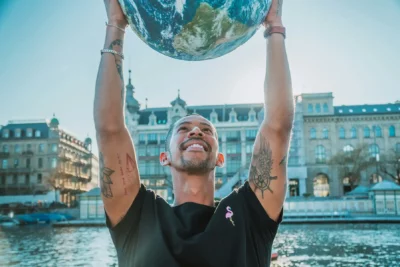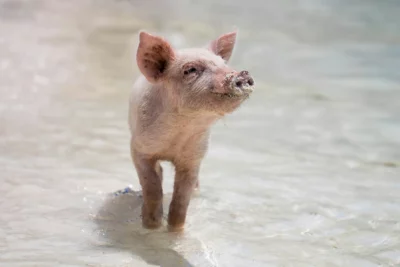Over the last decade, activists, scientists, and compassionate individuals worldwide have vocalized mounting evidence of climate breakdown. From rising temperatures and oceans, to vanishing wildlife, the global picture is deeply concerning. Yet in the midst of this crisis, there are signs of change and while there is still a very long way to go, we highlight these steps as a way to encourage, motivate, and inspire all those who are working to protect the natural world.
Reaching Peak Meat
Animal agriculture remains a leading cause of deforestation, greenhouse gas emissions, water pollution, and wildlife loss. If we want to protect the planet, we need to curb this dangerous industry, and there are encouraging signs that this is starting to happen.
While Big Ag continues to push its products in economy-emerging territories, three countries have now reached peak meat: New Zealand, Canada, and Switzerland. They are the first of many with Europe and the United States expected to reach peak meat by 2025. These successes are due to the millions of individuals—from the flexitarians and reducetarians to the vegetarians and vegans—who are recognizing the impact of their food choices and making changes in their consumption.
Encouragingly, the next ten years could see a rapid decline in beef consumption due to the huge demographic differences between those who consume beef and those who don’t. As beef products are by far the most environmentally destructive, this is very positive news for the planet, but it is just the beginning of what is needed. Conversations around the planetary impact of dairy, eggs, and meat from other animals, still need to break through, so here is some food for thought: Soy milk has less than one-third the emissions of milk from cows, and tofu has less than one-third the emissions of chicken and is 31 times less damaging than beef.

Renewable Energy on the Rise
It’s taken longer than we all hoped, but renewable energy is growing faster than ever before.
This is set to keep accelerating now that renewable energy has become cheaper than fossil fuels, indicating that markets are shifting towards a greener future. The World Economic Forum predicts that by 2050, solar power will be the primary source of power in the US, accounting for over 50 percent of the nation’s electricity. In 2021, the International Energy Agency reported that renewables accounted for nearly 30 percent of the world’s electricity generation. They also predict that by 2028, 42 percent of the world’s energy will come from renewables.
Smaller nations are also setting the example that renewable energy, when planned and executed correctly, can provide reliable power for everyone. In 2023, Portugal became the first country to run solely on renewable energy for a week. An incredible achievement!
Governments Wake up to Impacts of Animal Agriculture
Animal agriculture has traditionally been protected by governments, despite its huge impact on the planet. Protective policies such as subsidies, market protection, and tax breaks have long been commonplace. However, more progressive governments are beginning to create policies that accurately reflect animal agriculture’s catastrophic impact on the planet.
Dairy farmers in Denmark will now pay an annual tax of 672 krone ($96) per cow for the emissions they generate. This world-first tax on agricultural emissions also includes a roadmap for integrating more environmentally friendly plant-based foods into society. Switzerland has introduced import taxes on meat products, which has led to decreases in per capita meat consumption in recent years. With the climate crisis already upon us, it is crucial that more countries take action like this.
Plant-Based and Cultured Meats Flourish
The last ten years has seen an incredible boom in plant-based and cultured meat products. These technologies have the potential to render traditional animal farming obsolete, thereby eradicating one of the most environmentally destructive industries on the planet. Each year that goes by we get closer to this goal!
It’s now possible to get burgers, sausages, nuggets, ground meat, and more that accurately replicate animal products at a fraction of the environmental toll. Beyond Meat’s flagship burger emits 90 percent less greenhouse gasses, uses 97 percent less land and water, and requires 37 percent less non-renewable energy than a standard beef burger. Every person that chooses a Beyond burger over a beef burger is significantly reducing their carbon footprint.
There have also been huge breakthroughs in cultivated meat and precision fermentation technologies, which are receiving more and more investment from governments. Singapore recently approved the public sale of cultivated chicken products, crucially at a competitive price point. If governments continue to support these innovations, there is no doubt that cultured meat technologies have the power to bring in a raft of positive changes.
More Trees Planted than Ever Before
The last ten years saw tree planting becoming one of the most utilized tools in the fight against climate change. In fact, two record-breaking events took place, as countries adopted planting projects to improve their carbon capture. In 2016, 49.3 million trees were planted by nearly a million volunteers in India. This world record didn’t last long, as Ethiopia reported planting 350 million trees in one day!
Tree planting, if done with a focus on biodiversity, native species, and ecosystems, continues to be a vital tool in the fight against climate breakdown. Hopefully we will see Ethiopia’s record beaten in the next decade and many more areas of our world reforested.

Tackling Single-Use Plastics
Single use plastics are a scourge on our planet’s biodiversity. Plastic products like bags, straws, stirrers, and food packaging make their way into our rivers and oceans, where they strangle wild animals and pollute ecosystems. Microplastics—the result of plastics breaking down—have polluted every part of our planet, from the Mariana Trench to the summit of Mount Everest, and are even found inside all our bodies. The work to end this shocking pollution has been slow to get going but there are signs that things are turning around.
Bangladesh was the first country to ban plastic bags in 2002, and the United Nations reports that since then, 91 countries have enacted a full or partial ban. In Kenya, it is illegal to manufacture, use, or import plastic bags. We know that such action works. In almost every case of a ban, or even simply a levy, plastic bag use drops significantly.
Alongside levies and bans, thousands of good-hearted people and organizations regularly turn out to clean up beaches and remove plastics from our oceans. Mumbai’s Versova beach became one of the main symbols for successful cleanups when locals collected over 400 tons of plastic waste in a year. Startups like The Ocean Cleanup from the Netherlands are even preparing to take on the Great Pacific Garbage Patch. Many other non-profits like 4ocean make products from ocean plastic to raise public awareness of the issue.

Veganic Farming Is Growing 🌱
Veganic farming practices, whilst still in their infancy, have gained traction in the last decade as more small-scale farmers ditch animal inputs, fertilizers, and pesticides, for more sustainable agricultural practices.
Large scale monoculture farming is damaging the planet by degrading soil health, polluting rivers and lakes, harming biodiversity, and reducing resilience to extreme weather. Clearly change is needed. Thankfully, there are more and more local heroes doing just that every year. In November 2024, the second ever Veganic Summit took place in Quebec, bringing together thousands of veganic farmers who shared their successes, knowledge, and expertise.
One of those is Iain Tolhurst, a British farmer, who manages an eight-hectare farm that produces food with veganic methods that are shown to be 90 percent more efficient than the production of conventional supermarket produce. Lazy Millennial Farms in California, was founded as a fully veganic farm and reported zero losses in yield compared to other farms in the area.
While the effects of the current efforts are small-scale, veganic farmers are setting a powerful example that more sustainable and ethical farming can provide better yields, whilst helping safeguard the future of our planet.
New Laws Fight Greenwashing
A new EU directive has been passed this year, which aims to empower consumer freedom for the green transition. Companies can no longer use vague, unsubstantiated marketing terms like ‘environmentally friendly’ or ‘carbon neutral’ when those claims are based on offsetting programs, which have been shown to be largely worthless.
The new directive is part of a larger package of reforms which also includes stricter regulation on sustainability labels and other measures. For too long, companies have changed nothing except their marketing strategy to convince people that they are doing the right thing. It’s time they were held to account.
Green Parties Emerging
While individuals can play a key part in protecting the planet, we need national governments to take decisive action. It is only at the parliamentary level that widescale change can happen quickly, and electing green candidates is a powerful act.
While many countries around the world continue to be led by climate change deniers, Brazil voted out Jair Bolsonaro in 2022. During his tenure, he had overseen a 53 percent increase in deforestation by cattle ranchers and those growing feed for farmed animals. He had also approved thousands of new pesticides and dismantled environmental protections and regulations. His removal from top office was essential for the protection of our planet.
There are green shoots in politics everywhere with environmentally-focused parties existing in almost every country. The UK currently has four elected Green MPs, while Denmark and Sweden each have three, and Mexico has just elected a climate scientist as president.
Conclusion
Progress is made one action, one movement, and one commitment at a time. Whether that is eating vegan for the planet, joining a beach clean-up or tree planting program, or canvassing for the most environmentally progressive politician, we can all be part of this important transition.
While the journey toward a truly sustainable planet is a long one, these changes remind us that there is hope. Every victory, big or small, brings us closer to a safer, kinder, healthier future. And that has got to be worth celebrating.



